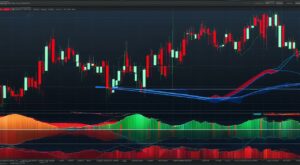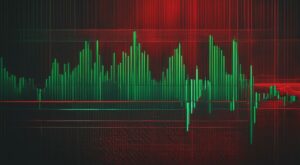Your cart is currently empty!
What are the Islamic Forex Trading Rules on Leverage?

Affiliate Disclaimer: This post may contain affiliate link or links
Forex trading can often seem like a complex world, especially when one follows the precepts of Islam. In Islam there are rules apply when it come to trading with leverage and to understand it you need to keep reading.
Islamic Forex trading adheres to Sharia law. Leverage is allowed if no interest is charged. Risk-sharing models, like Mudarabah, are preferred. Traders seek Halal opportunities with ethical and transparent practices.
Contents
Islamic Forex Trading Rules on Leverage
This comprehensive guide to Islamic Forex Trading aims to shed a clearer light on this topic, with a specific focus on the Islamic forex trading rules on leverage.
Unlock the secrets of financial success with Islamic forex trading rules on leverage. Explore the ethical approach to wealth creation in the dynamic world of currency exchange, guided by Sharia principles

Islamic Forex Trading Explained
Islamic forex trading comes into play for conscientious Muslim forex traders who seek to align their trading activities with their religious beliefs.
This form of trading is, at its core, Shariah compliant forex trading, meaning it adheres to the ethical guidelines outlined in Islamic law.
While every trader is concerned with profit, in Islamic finance forex trading, ethical considerations are paramount.
This takes into account factors such as refraining from prohibited transactions in Islam, avoiding interest related transactions (Riba), and adhering strictly to ethical trading principles.
Islamic Forex Trading and Leverage
Leverage is a tool in forex trading that allows traders to borrow funds to increase their trading positions. In regular forex market, leverage could be as high as 500:1 but in Islamic forex trading.
The allowed leverage in Islamic forex trading is typically lower. As this area can be controversial due to the potential for accruing interest.
Most scholars permit the usage of 1:1 leverage forex trading as it promotes responsible trading, and avoids any form of Riba (interest), which is forbidden in Islam.
The usage of 1:1 leverage forex trading thus emerges as an acceptable practice in Islamic trading circles. This one-to-one ratio means that for every dollar a trader invests, he or she can trade $1 of a currency pair.
This kind of trading encourages caution, responsible decision-making, and the cultivation of patience.
Importantly, this practice helps prevent any transactions that could potentially incur interest, or Riba, which is explicitly forbidden in Islam.
It’s a safeguarding rule that preserves the sanctity of the financial transaction and keeps it free from any elements that are not in accordance with Islamic law.

Contracts in Islamic Forex Trading
Contracts form the heart of any trading activity. In Islamic forex trading, typical contracts that are often utilised are the Mudarabah Contract, Murabaha Contract, and Wakala Contract.
The terms of these contracts aim to strike a fair balance between the involved parties, thereby avoiding any form of usury, uncertainty or gambling, in accordance with Islamic law.
These contractual terms also ensure that all parties are treated with respect and equality, promoting mutual consent and transparency in all dealings, which is a fundamental aspect of Islamic law.
The idea is to promote ethical and just transactions that do not exploit any party. Any profits derived from such contracts must be legitimate and earned through permissible means.
Therefore, they forbid activities that involve deception, harm, or any undue gains. This way, such contracts contribute to the broader goal of promoting social justice, economic equitability, and welfare in the community.
It’s a holistic approach aligning financial activities with moral principles.

Avoiding Riba in Islamic Forex Trading
In Islamic finance, interest (Riba) is strictly forbidden, including forex trading. Thus, avoiding interest forex trading becomes an absolute necessity.
This is aided by swap-free forex accounts which accommodate Muslim traders by not charging or paying overnight interests — aptly named no overnight fees Islamic accounts.
Speculation in Islamic Finance
Speculation, or making money from betting on future prices, also goes against Islamic law.
As such, getting rid of trades that incorporate components of gharar (uncertainty) and maysir (gambling) are key considerations in Islamic forex trading.
Therefore, trades need to be backed by real, physical goods, such as currency or commodities.
Islamic Forex Trading Tools
A number of tools are typically used in forex trading for decision making. These tools remain permissible so long as they don’t promote unethical behaviour.
This includes fundamental analysis forex Islam, which analyses economic indicators and news to predict future price movements, and technical analysis forex Islam, which depends on past price patterns.
| Trading Tools | Description | Compliance in Islamic Finance |
|---|---|---|
| Fundamental Analysis | Predicts future price movements based on economic indicators and news | Compliant, given it encourages well-informed decisions |
| Technical Analysis | Forecasts future price trends based on historical data and statistics | Compliant due to its analytical, rather than speculative, nature |
| Economic Calendar | Provides dates and times of key economic events that impact financial markets | Compliant, as it aids traders in making informed decisions |
| Trading Charts | Visual representation of price movements over a specific timeframe | Compliant, when used for analysis instead of speculation |
| Islamic Forex Signals | Trade suggestions based on market analysis | Compliant if underlying trades conform to Islamic principles |
| MetaTrader 4 and 5 | Commonly used trading platforms for forex, stocks, and futures | Compliant if used for halal trades and without incurring interest |
| Copy Trading Platforms | Platforms that allow traders to mimic the trades of experienced traders | Compliant if copied trades adhere to Islamic principles |
| Automated Trading Systems | Computer programs that execute trades based on predefined criteria | Compliant if they do not involve prohibited transactions or elements of uncertainty (gharar) |
| Islamic Forex Trading Accounts | Forex trading accounts compliant with Islamic law | Compliant as they don’t incur swap or rollover interests |
| Swap-Free Accounts | Forex accounts that eliminate the swap or rollover interest on overnight positions | Compliant due to the absence of Riba (interest) |

Types of Trading in Islamic Finance
In Islamic finance, permissible trading forms far exceed forex, and include a broad spectrum of asset classes such as gold trading in Islam, silver trading, CFD trading Islam, commodities trading Islam.
And indices trading Islam, among others. All adhere to Islamic principles, promoting ethical trading devoid of Riba.
| Type of Trading | Description | Compliance |
|---|---|---|
| Currency Pairs Trading | Trading in forex pairs. | Compliant if no Riba and adheres to AAOIFI standards |
| Gold Trading | Trading in physical and non-physical gold | Compliant if physical and immediate |
| Silver Trading | Trading in physical and non-physical silver | Compliant if physical and immediate |
| CFD Trading | Contract for difference trading | Scholars have differing opinions |
| Commodities Trading | Trading in physical commodities | Compliant if physical and without speculation or ambiguity |
| Stock Trading | Trading in company stocks | Compliant if company operations are halal and without gharar or maysir |
| Indices Trading | Trading in market indices | Scholars have differing opinions |
| Cryptocurrencies Trading | Trading in digital currencies like Bitcoin | Scholars have differing opinions |
| Automated Trading | Using machines or computer programs for trading | Compliant if all operations follow Islamic law. |
| Copy Trading | Copying trading movements of other successful traders | Compliant if underlying trades are halal |
| Option Trading | Trading in the option to buy or sell a stock at a specific price | Not compliant due to element of uncertainty (gharar) |

Islamic Forex Trading Accounts and Brokers
For Muslim traders, finding brokers that provide Islamic managed accounts can be challenging. However, certain brokers offer PAMM accounts in Islam which are managed according to Islamic principles.
These individuals typically appear on halal brokers lists. Numerous Arabic forex brokers provide such specialised services, as well as brokers offering Islamic accounts in UK and Europe.
One of the main challenges for committed Muslim forex traders is to find brokers that adhere to their religious beliefs and practices. The advent of halal brokers lists has greatly alleviated this issue.
These lists comprise of brokers who operate within the confines of Shariah Law and hold firm to the moral compass of Islam while navigating the financial waves of the forex market.
These brokers offer Shia adherents an opportunity to trade ethically without compromising their religious convictions. Many Arabic forex brokers are leading the way in offering such specialised services.
Their deep understanding of Islamic law and culture thickens the trust chain, paving the way for a personalised and comfortable trading environment.
Similarly, this specialty service is not isolated to the Middle East alone. Many brokers in the United Kingdom (UK) and Europe now offer separate Islamic accounts.
Giving traders across the globe equal opportunities to be part of the financial world without conflicting their beliefs. This underscores that the finance sector is being more inclusive, regardless of your faith or location.
| Broker Name | Country Based In | Website |
|---|---|---|
| Al-Baraka | Dubai, UAE | www.albaraka.com |
| WaseetForex | Riyadh, KSA | www.waseetforex.com |
| DeenForex | Cairo, Egypt | www.deenforex.com |
| EtmaalFinance | London, UK | www.etmaalfinance.com |
| HalalFSBroker | Istanbul, Turkey | www.halalfsbroker.com |
| AmalTrade | Kuala Lumpur, Malaysia | www.amaltrade.com |
| AkliahInvesting | Kuwait City, Kuwait | www.akliahinvesting.com |
| HaqqiForex | London, UK | www.haqqiforex.com |
| TijarahFX | Islamabad, Pakistan | www.tijarahfx.com |
| BarakahCap | Dubai, UAE | www.barakahcap.com |

Guiding Standards and Certifications in Islamic Forex Trading
The AAOIFI standards not only provide a framework for compliance but also emphasize the ethical obligations in Islamic finance.
They insist on several principles such as righteous conduct, integrity, transparency, and responsibility in the operations of Islamic financial institutions.
Adherence to these guidelines is necessary as it reiterates the commitment of these entities to provide Shariah-compliant services.
The standards cover a range of areas, including leasing, sales, partnerships, and investments ensuring all aspects of Islamic finance are catered to.
Beyond the AAOIFI guidelines, another key authority that helps maintain decorum and order in the world of Islamic forex trading is the issuance of Shariah board fatwas.
These serve as a form of Islamic jurisprudence, providing verdicts on a wide range of matters pertaining to Islamic finance and investing.
The fatwas act as guiding beacons, helping practitioners navigate the complexities of the financial world in accordance with Islamic law.
To further instil trust and confidence amongst stakeholders, financial institutions also pursue Shariah compliance certification.
This certification is a confirmation that a product, service, or operational aspect of the institution meets the strict requirements set by Shariah law.
This adherence to AAOIFI guidelines, the honouring of Shariah board fatwas.
And the pursuit of Shariah compliance certification are all actions that shine a light on the unwavering commitment to uphold the tenets of Islam in the financial landscape.
This trio forms a robust infrastructure that ensures a clear moral compass is provided, guiding Islamic finance so that its principles align perfectly with the ethical and religious beliefs inherent in Islam.

Conclusion
Islamic forex trading is a vibrant field that allows Muslim traders to participate in the global economy while upholding the tenets of their beliefs.
Ensuring that Islamic forex trading rules on leverage are followed, helps to guarantee the avoidance of Riba, gharar and maysir – integral aspects of adhering to a clean, conscious, and compliant trading outlook.
Other related articles
- Trade Report Indicator: Indicator for Forex Traders
- Trend Profiteer Trading System: A Trader’s Must Have
- Quantum Trend Sniper Indicator MT4: Free Download
- German Sniper Indicator: Unveiling its Power
- Mastering MACD Intraday Trend | Indicator Free Download
- Crazy Accurate 5-Days Breakout Strategy: Unlock Success

Joseph Benson, I have been trading forex for more than 15 years now and I am still trading actively, a content writer, an Architect also SEO expert, learn how to trade easily with me.










Leave a Reply